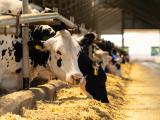Apr 7, 2009 (CIDRAP News) The US Food and Drug Administration (FDA) proposed yesterday to delay by another 2 months a long-planned ban on the use of certain cattle materials in any animal feed, a measure designed to prevent the spread of bovine spongiform encephalopathy (BSE), or mad cow disease. The ban would take effect Jun 26 instead of Apr 27.
The agency said it was proposing the delay because some cattle industry groups have expressed concern about their ability to comply with the rule by Apr 27, with some saying they are finding it difficult to find other ways to get rid of materials that can no longer be made into animal feed.
The banned items, known as specified risk materials (SRM), include the brains and spinal cords of cattle more than 30 months old. The FDA is also providing a week for public comment solely on whether to delay the ban.
The ban, first announced a year ago, is poised to take effect more than 5 years after the first US BSE case was discovered, in a Canadian-born cow in Washington state in December 2003. Canada, which detected its first BSE case a few months earlier and has identified about a dozen since then, imposed a similar ban in July 2007. The United States has identified three cases, the last in March 2006.
To prevent the spread of BSE, the United States and Canada both banned the use of cattle protein in feed for cattle and other ruminants in 1997. After their first BSE cases, both countries banned the use of SRM from cattle older than 30 months in human food.
Proposals to ban SRM from all animal feed and pet food grew out of concerns that the BSE agent could spread if feed intended for nonruminant animals, such as pigs, poultry, or pets, was inadvertently mixed with cattle feed during production or transport or was accidentally given to cattle on farms.
The National Cattlemen's Beef Association (NCBA) criticized the FDA in a statement today, saying the agency should reopen public discussion of the ban to allow for full consideration of problems it will cause. Dr. Elizabeth Parker, the NCBA's chief veterinarian, called the 7-day period for commenting on the 2-month delay "a weak and ineffective response to the issues already arising from this ill-considered decision."
Existing BSE safeguards have limited the prevalence of BSE in healthy US cattle to a "negligible" level, the NCBA said. The group argued that the expanded feed ban will yield little benefit for animal health or food safety while causing "tremendous costs" and disposal problems for ranchers.
"This rule has essentially ended rendering services in many parts of the country, and left producers with no legal alternatives," said Parker.
See also:
FDA announcement on delay of BSE final rule
http://www.fda.gov/AnimalVeterinary/NewsEvents/CVMUpdates/ucm133462.htm
Apr 24, 2008, CIDRAP News story "FDA broadens BSE-related feed ban"



















